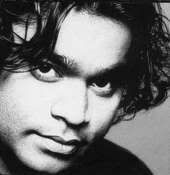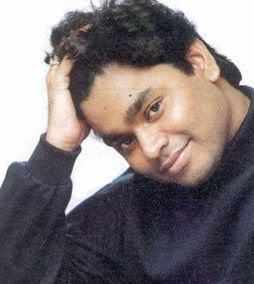ARR: The Urban Legend
Thursday, November 30, 2006
 ‘Chinna Chinna Aasai’ sang Minmini almost 15 years back, heralding a new era in Indian music. The world sat up to take notice of this new sound. A brand new star was born.
‘Chinna Chinna Aasai’ sang Minmini almost 15 years back, heralding a new era in Indian music. The world sat up to take notice of this new sound. A brand new star was born.
A R Rahman burst through like a breath of fresh air with Mani Ratnam’s Roja and changed the way Tamil and slowly rest of India’s music sounded. Ilaiyaraja had ruled the South till then as the undisputed king among the composers. There was none to beat him, no one even to come near him. If the ‘maestro’ decided to do the score for your movie, you can rest easy in the knowledge that you are going to have a hit on your hands.
Raja’s sounds were mostly grounded in a rural background – the harmonium famously was at the composer’s fingertips at any given time. That doesn’t mean that his songs were only of the typical folk song variety. His music for Mani Ratnam’s hit ‘Dalapathi’ was phenomenal. He has composed some of Tamil industry’s most famous songs – ‘Ilamai ennum poongatru’, ‘Idhu oru pon maalai pozhudhu’, ‘Raja raja sozhan’, to name a few.
Most of his contemporaries also went along the same route – M S Viswanathan, Deva (who was more like a poor man’s Raja), Gangai Amaran etc. Ilaiyaraja did not really have any real competition – he ruled alone and he ruled long. Till a 25 year old genius burst into the scene.
A slight difference of opinion between Mani Ratnam and his favourite composer urged him to look for a composer elsewhere, latched onto the young Rahman who was busy composing ad jingles and the rest, as they say, is history. His choice of instruments, the arrangements he used, the different tones and tunes he produced – everything was as different from the prevalent music of the day as the proverbial chalk is from cheese. The public lapped it up eagerly and were soon hungry for more.
He followed Roja with some memorable songs from Thiruda Thiruda, Gentleman, Puzhiya Mugam, May Maadam, Karuthamma, Duet,Indira, Bombay, Rangeela and more recently, Taal, Lagaan, Boys Rang De Basanti and Guru. He was the first ever music composer to win the coveted Rajat Kamal Award at the National Film Awards for his debut effort. He has gone on to win this award thrice more, for Minsaara Kanavu, Lagaan and Kannathil Muthamittal - the most by any music director.
The awards he has won, the global recognition he has achieved, the wide range of projects he’s been a part of is too many to list. More than anything, what he has single-handedly done is changed Indian background music forever. Till he came onto the scene, filmi music was primarily used to give the audience a break from the onscreen action. With his advent, that changed completely – a movie’s soundtrack became as important as the movie itself. Cassette sales soared and became an indication of how the movie would fare at the box-office.  Above all, Rahman introduced the Indian audience to a brand new, urban sound. Till then, most of our music was of the folksy, villagey type and the disco numbers all sounded a bit samey. Rahman blew that whole scene out of the water and brought in new sounds – techno, electric, big orchestra arrangements that sounded like nothing like what we had heard before.
Above all, Rahman introduced the Indian audience to a brand new, urban sound. Till then, most of our music was of the folksy, villagey type and the disco numbers all sounded a bit samey. Rahman blew that whole scene out of the water and brought in new sounds – techno, electric, big orchestra arrangements that sounded like nothing like what we had heard before.
With Alaipayudhey, he introduced the audience to the new, sexed-up version of the normally staid Hindu wedding mantras. When he sang 'Mangalyam', blended it with those awesome beats and merged it so beautifully with the theme song Enrendrum punnagai - the effect was a thing of sheer beauty. For the first time ever, it it became cool to sing mantras!
But sounding quintessentially urban didn't mean that the man couldn't do villagey music. He sure could and did, in his own inimitable style and the resultant sound is normally something we've never heard before. I am, of course, talking of Then merkku paruva-k-kaatru from Karuthamma here. Even Kummi Adi is a typical village number, Rahmanified as it is!
I shall not be remiss in not mentioning his foray into Punjabi bhangra. Though he has said a lot of times that he felt comfortable with Tamil music, as he did not understand Hindi, he has composed some absolute gems for films like Rangeela, Taal, Bombay, Dil Se and more recently Rang de Basanti. The title song of RDB, sung by Daler Mehendi sounded absolutely fresh and completely different from the usual bhagra songs one often hears. Of course I do not listen to bhangra music much but to me, they always sounded the same - till ARR and the Ting ling ling ling.
Meanwhile, Rahman’s assistants branched off on their own and took the new Rahmanish sounds with them whilst some of the new ones on the horizon were inspired by it and started emulating the same. Harris Jayaraj (Minnale, Kaakha Kaakha, Vettaiyadu Vilaiyadu), Praveen, Vidyasagar, Bharadwaj, Devi Sri Prasad were all part of this new brigade. Though all of them have gone on to make some great music scores, there is none to touch ARR, none to match his attention to detail.
The consummate professional that he is, he clearly differentiates between what is played on screen and what you slip into your CD player, unlike the other music directors, whose screen music is no different from the on they release on CD or tape. This makes his music sound that much crisper when you listen to the audio whilst the video has a special extra bit going for it. A classic example of this is his recent Kummi Adi from Sillunu Oru Kaadal - while the CD version starts with a big bang, in the movie there is a slow, folksy interlude before the actual song.
Rahman also has a special music interlude for any crunch / special situations in the plot. Oftentimes, this would be the chorus part of the main romantic song of the movie. In the aforementioned movie, the main part of the song Munbe Vaa was the background vocal for the Gautham – Aishu wedding scene, the same song that they sing during happier times.
These might seem insignificant but attention to little details like this is what sets ARR apart. Devi Sri Prasad, in his latest hit Bommarillu would have done better to have picked up these tips from the master and utilised them in his song Laloo Darvaja. Whilst having Jayasudha sing the Krishna bhajan-type number makes sense in the movie and adds to the plot, it slows down the tempo of the song in the CD and breaks up the whole rhythm.
ARR is also the king when it comes to the quality of his music mixes. His music has a slick feel to it that, despite his detractors’ pronouncement that his tunes would never stand the test of time, have nonetheless stayed the same through the years. His old hits still sound just as melodious as they did the day they came out. Though Rahman’s music take a bit of getting used to, they do grow on you after repeated listens and become impossible to move away from.
The man is not without his particular quirks – one of the most famous ones being his penchant to record at night. He is famous for doing the best part of his recording with the moon; his singers are all well used to getting on the car in the dead of the night and finishing up at the break of dawn. Recently, though, he announced he was going to try to change that habit and carry on his recording work at daytime.
Another of his famous peculiarities is his wish to keep things natural – he is rather taken up by the ‘rawness’ of a voice. To that extent, he used to make singers out of people with no formal music training whatsoever, depending more on their raw tone of their voice to carry the tune through.
ARR has come a long way from his young Dileep days, when he was struggling to make ends meet. Today, he is one of the most famous music composers in the world. He has taken his music far and beyond the country’s shores – collaborating with Sir Andrew Lloyd Webber for Bombay Dreams, working on the Chinese film Warriors of Heaven and Earth and even composing the score for Lord of the Rings stage production. He has done all this and more; but to me, he will always remain the man who changed Indian music completely, forever.
His music is everything – slick, beautiful, sublime and timeless. Long may it resonate around the world.
Posted by DesiGirl 10:12 PM
Labels: allah, ARR, bombay, composer, hindi, indian, mani, movie, music, rahman, rakha, ratnam, roja, tamil
1 Comment:
-
- Rahmanic said...
4:19 AMHey Its a nice review luvd it keep it up.Sure rahman is a trendsetter.